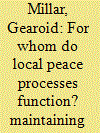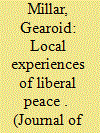| Srl | Item |
| 1 |
ID:
154730


|
|
|
|
|
| Summary/Abstract |
Recent peacebuilding literature provides a sustained critique of externally designed conflict management processes and promotes instead local mechanisms. Such mechanisms, it is argued, will provide more ownership and agency to local actors and, thus, a more sustainable peace. But while there are many examples of local conflict management institutions, and many discussions of the hybrid outcomes of interaction between the global and local, the literature rarely explores exactly what transpires on the ground when international actors influence the operation of local peace processes; this article provides exactly this insight. The data presented illustrate how local conflict management institutions in rural Sierra Leone are subtly manipulated by actors – both international and local – to maintain and enhance existing relations of power. The article illustrates, therefore, the problems that arise when local conflict management institutions become interlaced with new forms of power and start themselves to serve as sites of contestation and resistance.
|
|
|
|
|
|
|
|
|
|
|
|
|
|
|
|
| 2 |
ID:
146927


|
|
|
|
|
| Summary/Abstract |
Over the past 20 years scholars have repeatedly highlighted the complex relationship between conflict, peace and economics. It is today accepted that economic factors at the global, regional, national and local levels can promote conflict in various ways and that economic factors are therefore central in establishing a sustainable post-conflict peace. However, while the scholarly literature includes much nuance regarding the precise nature of these complex relationships, practices of peacebuilding are often far less nuanced. Instead there is a tendency to pin the hopes of fragile post-conflict states on establishing a liberalized and supposedly peace-promoting economy and a worrying absence of grounded assessments of the impacts of such policies. This article argues that the resulting lack of clarity regarding the local impacts of such peacebuilding mechanisms contributes to continued unwarranted enthusiasm for marketization among policymakers and practitioners. This issue is addressed directly by exploring the destabilizing and potentially conflict-inducing impacts of one foreign direct investment (FDI) project in rural Sierra Leone. The dominance of liberal approaches to economic policy within peacebuilding has recently combined with a surge in large-scale FDI projects, often labelled as ‘land-grabs’, which can be interpreted as a direct embodiment of the liberal peace paradigm. While the liberal peace assumes that such projects will help by paying taxes, rebuilding state capacity and employing idle young males, the article illustrates that among local populations such projects can be experienced as deeply disruptive and potentially conflict-promoting. It therefore describes four specific mechanisms by which the project in this setting endangers Sierra Leone’s still precarious transition to peace. The article concludes with recommendations for peacebuilding theorists, policy advocates and practitioners trying to navigate the difficult waters of post-conflict peacebuilding by way of large-scale FDI and marketization in general.
|
|
|
|
|
|
|
|
|
|
|
|
|
|
|
|